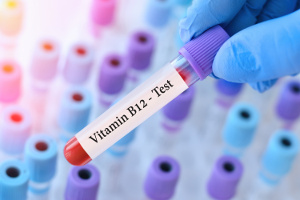Vitamin B12’s key role in healing processes and intestinal inflammation
 In connection with tissue lesions, vitamin B12 boosts cellular reprogramming to speed up the healing process. This was shown in a Spanish study of mice with ulcerous colitis (bleeding inflammation in the colon). Based on this, the researchers assume that vitamin B12 supplementation may be useful for speeding up the regeneration of damage intestinal tissue. They mention that vitamin B12 may also help reduce the type of complicated inflammation that is seen with ulcerous colitis, and which contributes to the destruction of the intestinal mucosa. In this connection, it is important to remember that vegan diets lack vitamin B12, and that weak stomach acid and the ageing process can also inhibit the absorption of the nutrient.
In connection with tissue lesions, vitamin B12 boosts cellular reprogramming to speed up the healing process. This was shown in a Spanish study of mice with ulcerous colitis (bleeding inflammation in the colon). Based on this, the researchers assume that vitamin B12 supplementation may be useful for speeding up the regeneration of damage intestinal tissue. They mention that vitamin B12 may also help reduce the type of complicated inflammation that is seen with ulcerous colitis, and which contributes to the destruction of the intestinal mucosa. In this connection, it is important to remember that vegan diets lack vitamin B12, and that weak stomach acid and the ageing process can also inhibit the absorption of the nutrient.
It is commonly known that vitamin B12 is important for cellular DNA-synthesis, red blood cell formation, and the nervous system. A team of Spanish scientists led by Dr. Manuel Serrano from IRB (Institute for Research in Biomedicine) in Barcelona has discovered that vitamin B12 also plays a key role in a process known as cellular reprogramming, which occurs during the initial healing stages in damaged tissue.
The researchers looked at cellular reprogramming in mice with ulcerous colitis and found that cells in the destroyed intestinal tissue consume large quantities of vitamin B12. Moreover, a vitamin B12 deficiency can turn out to be a limiting factor that impairs different aspects of cellular reprogramming.
As the mice already got sufficient amounts of vitamin B12 from their normal diets it came as a surprise to the scientists that supplementing with the vitamin could improve cellular reprogramming additionally. The researchers therefore assume that patients with inflammatory bowel diseases such as ulcerous colitis may benefit from high-dosed vitamin B12 supplementation.
Vitamin B12 and its role in cellular reprogramming
The researchers saw in their study how vitamin B12 blocks a metabolic process in the cells. This process is called DNA methylation and is a biological process in which a methyl group (-CH3) is added to the DNA molecule, which makes changes to the activity of DNA. They also observed that being vitamin B12-deficient during cellular reprogramming or healing processes can result in significant genetic alterations and lead to dysfunctions in several genes. The researchers believe that supplementation with vitamin B12 can correct this imbalance and support cellular gene functions, thereby improving reprogramming and the body’s ability to repair damaged tissue.
Vitamin B12 can also reduce chronic inflammation
Dr. Manuel Serrano and his team of scientists in collaboration with scientists from the University of Barcelona and Hospital Clinic in Barcelona have published a study that concludes that people with higher levels of vitamin B12 in their blood have fewer inflammation markers (IL-6 and CRP). They observed the same in older mice, suggesting that ageing is typically associated with low levels of vitamin B12 and chronic inflammation. The scientists think that vitamin B12 has an anti-inflammatory effect because it lowers levels of inflammation markers. Their work sheds a whole new light on vitamin B12’s potential health benefits.
Vitamin B12, sources, and supplements
Vitamin B12 is found exclusively in animal food sources. It is the only B vitamin that is stored in the body, so it may take several months or even a year before any deficiency symptoms occur as a result of eating a strict plant-based diet.
The body’s uptake of vitamin B12 is dependent on a carrier protein called intrinsic factor, which is produced in the gastric mucosa and works by carrying vitamin B12 from the small intestine into the blood barrier. Pernicious anemia is a potentially life-threatening autoimmune disease that is caused by lack of intrinsic factor and vitamin B12. Weak stomach acid and gastrointestinal diseases can also inhibit the uptake of the vitamin. In addition, antacids, smoking, alcohol abuse, birth control pills, and metformin for treating diabetes can increase the need for vitamin B12.
Studies show that many vegans, vegetarians, older people, and diabetics lack vitamin B12. In the case of severe deficiency, vitamin B12 injections are administered. It is also possible to take vitamin B12 in supplement form, for example lozenges that ensure good absorption via the oral mucosa.
References:
Institute for Research in Biomedicine (IRB Barcelona). Vitamin B12: A key player in cellular reprogramming and tissue regeneration. ScienceDaily. November 16, 2023
Marta Kovatcheva et al. Vitamin B12 is a flimiting factor for induced cellular plasticity and tissue repair. Nature Metabolism. 2023
Ebba Nexø. Vegetarer risikerer at få for lidt B12-vitamin. Videnskab.dk marts 2018
Trinity College Dublin. Many older adults are deficient in vitamin B12 and folate. ScienceDaily June 26, 2018
Vanita R Aroda et al. Long-Term Metformin Use and Vitamin B12 Deficiency in the Diabetes Prevention Program Outcomes Study. Endocrine Society 2016
TIP! See also the related articles
Search for more information...
- Created on .








